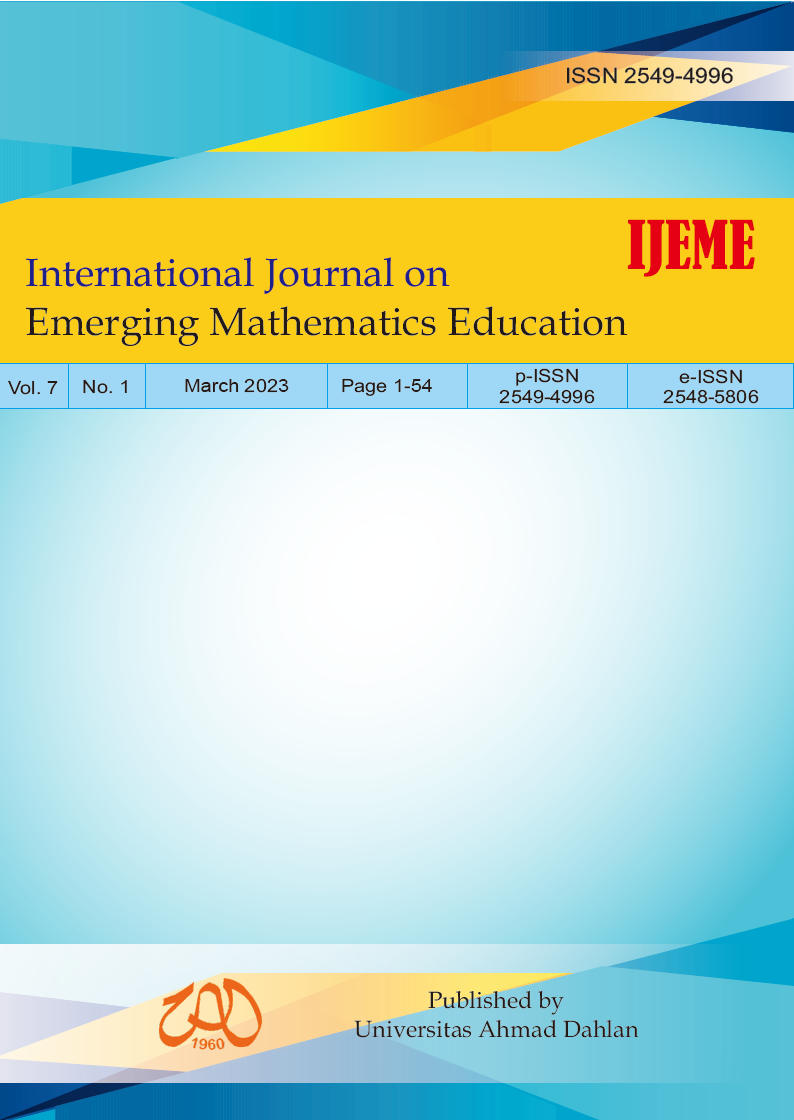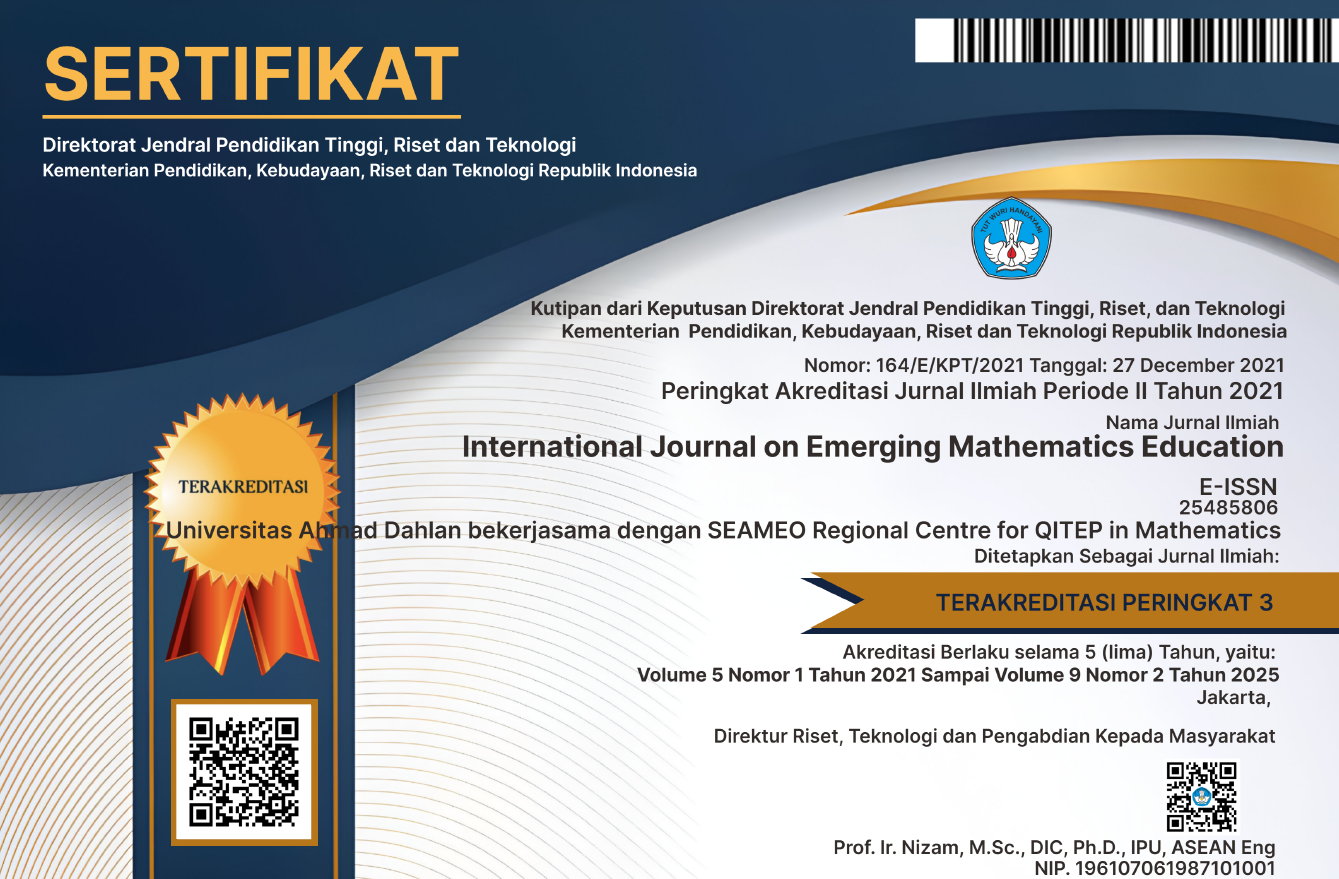Using Context of Local Environment Maps to Develop Lesson Plan which Foster Mathematical Literacy
DOI:
https://doi.org/10.12928/ijeme.v7i1.25764Abstract
Mathematical litreracy is defined as individual capacity to reason mathematically, to formulate, to employ, and to interpret mathematics, and to solve problems in the various real-life contexts. These skills are important for students but PISA – an OECD program to assess these skills – reported that the Indonesian students’ performance in mathematical literacy remains low for decades mostly due to instructional factor. It also happened in SMP N 2 Cimerak – a junior high school in Pangandaran, Indonesia, that the students still need a lot of improvement in mathematical literacy skills and their teachers also needs to develop capacity to teach the skills. This research aims to develop a valid and practical lesson plans which could be used to foster mathematical literacy. The lesson plans also include powerpoint presentation slides, students’ worksheet, teaching materials, and assessment instrument. It was a modified version of R&D introduced by Plomp which consist of stages: initial investigation, design, construction, evaluation, and final product. In the evaluation stage, we involved four experts to validate the lesson plans and 26 junior high school students to test the lesson plans, and revised them accordingly. The results suggest that the lesson plans are valid with the score of 4.46 (lesson plan), 3.96 (PPT slides), 4.38 (worksheet), 4.00 (teaching materials), dan 4.39 (assessment). The validity could be explained from the accommodation of mathematical literacy domains such as contexts (job and society, local environment maps), content (change and relationship, Cartesian coordinate), process (manifested in the problem-based learning), and the skills (communication, mathematization, representation, reasoning, devising strategies, using symbols, and using mathematics tools). The testing also resulted in 84.19 score of students’ positive responses and 3.92 (good) score of practicality. Moreover, the lessons also have potential effects in fostering students’ mathematical literacy viewed from the observation of mathematical literacy process, which suggest that 3.8% students in low performance, 53.8% students in intermediate performance, and 42.3% students in high performance. Therefore, the lesson plans were valid, practical, and having potential effect in fostering students’ mathematical literacy.Downloads
Published
How to Cite
Issue
Section
License
License and Copyright Agreement
In submitting the manuscript to the journal, the authors certify that:
- They are authorized by their co-authors to enter into these arrangements.
- The work described has not been formally published before, except in the form of an abstract or as part of a published lecture, review, thesis, or overlay journal. Please also carefully read the International Journal on Emerging Mathematics Education (IJEME) Author Guidelines at http://journal.uad.ac.id/index.php/IJEME/about/submissions#authorGuidelines
- That it is not under consideration for publication elsewhere,
- That its publication has been approved by all the author(s) and by the responsible authorities, tacitly or explicitly, of the institutes where the work has been carried out.
- They secure the right to reproduce any material that has already been published or copyrighted elsewhere.
- They agree to the following license and copyright agreement.
Copyright
Authors who publish with the International Journal on Emerging Mathematics Education (IJEME) agree to the following terms:
- Authors retain copyright and grant the journal the right of first publication with the work simultaneously licensed under a Creative Commons Attribution License (CC BY-SA 4.0) that allows others to share the work with an acknowledgment of the work's authorship and initial publication in this journal.
- Authors are able to enter into separate, additional contractual arrangements for the non-exclusive distribution of the journal's published version of the work (e.g., post it to an institutional repository or publish it in a book), with an acknowledgment of its initial publication in this journal.
- Authors are permitted and encouraged to post their work online (e.g., in institutional repositories or on their website) prior to and during the submission process, as it can lead to productive exchanges, as well as earlier and greater citation of published work.
![]()
Ciptaan disebarluaskan di bawah Lisensi Creative Commons Atribusi-BerbagiSerupa 4.0 Internasional.





